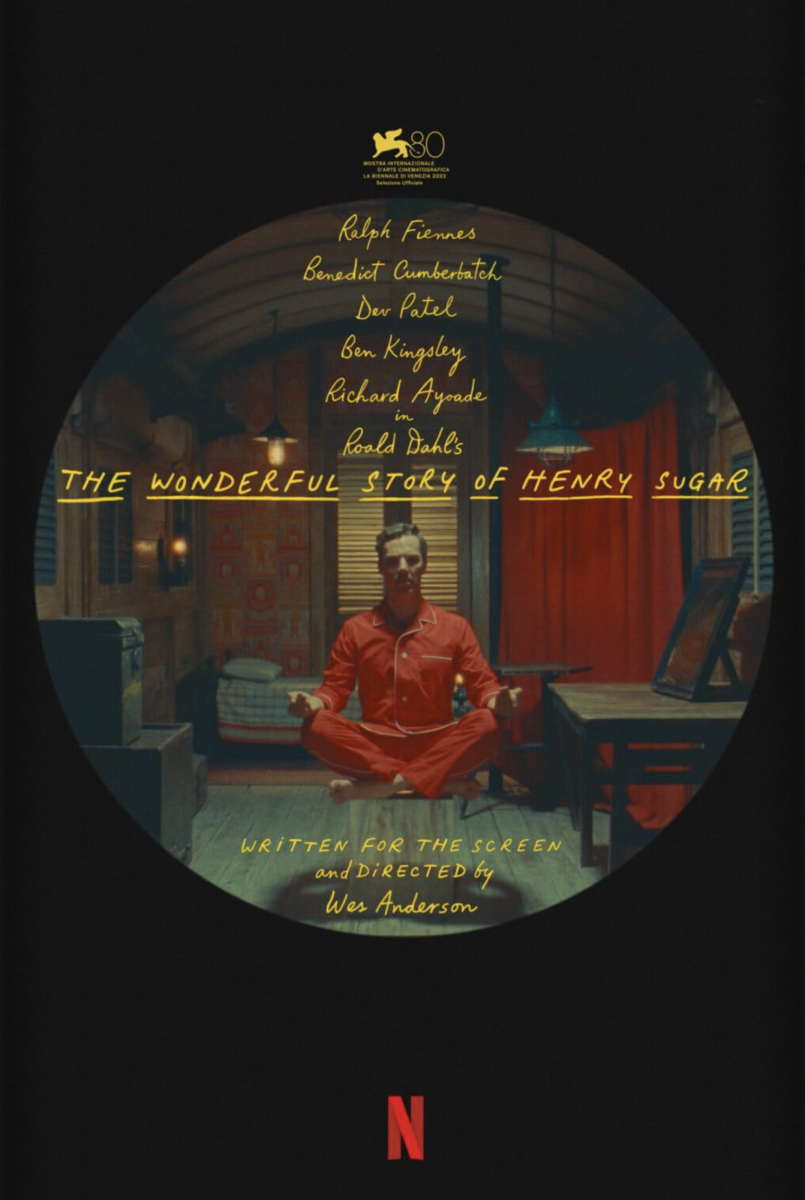James Watson
Wes Anderson — our boy — had a mad productive year in spite of an industry that is facing an uphill battle of reinvention. This dude appears to be putting out the most work he has in any given time. It started this year with “Asteroid City,” a movie I loved…I don’t remember where you fell on it.
Adam Coil
Ultimately, I liked “Asteroid City.” I think that it’s a step in the wrong direction for him, but we can talk more about that later.
JW
I think you’re getting at something that occurred to me when we were watching his new short film, “The Wonderful Story of Henry Sugar,” and that is that I think he wants to direct a play. And that’s part of “Asteroid City,” right? It’s literally about a theatrical production. That’s something people like to talk about a lot with Anderson — specifically, that he kind of has a troupe of actors, so he’s kind of giving in to that theatrical identity a bit. Why do you think he’s gone down that road?
AC
First, I want to say that it’s crazy that he dropped a feature length and then four short films only two years after “The French Dispatch,” which I honestly thought was going to be his magnum opus.
JW
You could call it quits there.
AC
Exactly. I mean, it was a humongous film. It was a humongous film that blew me away. Not only on the first watch, but, for me, I think it keeps getting better each time.
JW
I think it’s kind of about himself.
AC
Oh, yeah. I remember a piece about how [Anderson] was very much into the New Yorker when he was little, and most of the characters are based off of famous New Yorker staffers.
JW
Yeah, Jeffery Wright is supposed to be James Baldwin, etc. I also think “[The French] Dispatch” was the start of this new “New Wes” generation. Because I think all of these feel like extensions of the creative Mojo he was working with.
AC
To go back to your earlier question, “Why do I think [Anderson] went in this direction?” It just seems like he can’t help himself. These are the types of movies he wants to make. I mean, is it crazy to say that “[The Wonderful Story of] Henry Sugar” might be [the] most visually impressive work he’s ever made?
JW
I mean, there’s a lot of wizardry going on here. Because a lot of times when we’re changing locations in “[The Wonderful Story of] Henry Sugar,” sets are just coming up. They’re flying props out, instead of hard cut transitions to something else. And, obviously, I’m sure there might be some…CGI wizardry going on with some of it, but it’s supposed to impress upon us a real tangibility.
AC
Yeah, like you’re saying, it translates to the theater extremely well, but was there much story there?
JW
I think you’re starting to hear a lot of people talk about that. That was a huge complaint with “The French Dispatch.” A lot of people liked what they saw, but they didn’t feel any of it. And my kind of counter argument is that I think there’s actually a lot of heart and emotion in “[The French] Dispatch,” but you kind of have to Frankenstein it together, which maybe isn’t good writing. But to me, it’s there. And I think a lot of people are starting to incorrectly see this trajectory he’s on as all fluff with no soul. Now, to me, the production itself provides the soul, but I totally empathize with people who just find, you know, his late period stuff cold and alienating.
AC
I definitely wouldn’t go so far as to say it’s cold and alienating. I found a lot of story and a lot of heart in “The French Dispatch.” With “Asteroid City,” maybe it’s there. I’ve only seen it twice. But it felt like a step in the wrong direction. It felt too sparse. Too many layers, too much fluff, as you’ve mentioned. And then “[The Wonderful Story of] Henry Sugar” — I don’t know exactly what to do with [it] because it’s not a full length film, right? The more time you spend with a character, the more you’re going to feel for them, generally. So it’s hard to judge, but I don’t know if I really felt anything for Henry Sugar or his story.
JW
Yeah. Well, it moves at a breakneck speed. It really zips.
AC
I’m sounding more critical than I want to because, honestly, I loved it. I just would have liked more.
JW
I think that they are really expensive exercises for him, more or less. This is Anderson’s version of weight training, but we’re kind of spoiled by this style at this point. The blocking is so good. I think “Asteroid City” is peak for blocking. Because he is such a prolific auteur, he doesn’t really have any other peers that are producing this quantity of work with as much care and detail.
AC
I mean, I would be blown away if Anderson can make a more Anderson film than “[The Wonderful Story of] Henry Sugar.” It just felt like if you turned the Anderson aesthetic crank to the maximum — which I love. But I’m just really curious as to where he goes from here. I don’t know how much more ground he can break in this direction.
JW
I wonder if people’s boredom with the style comes from how different his writing has been, now that he’s not with the same collaborators. Watching “The Life Aquatic [with Steve Zissou]” and then watching “Asteroid City” — that’s a totally different guy under the hood there, you know?
AC
I think so. If you go back and watch “The Darjeeling Limited” or “The Life Aquatic,” there are certain moments in there that just punch you in the heart.
JW
Those are sorrowful movies.
AC
Yeah, but they also have some really happy moments. As you know, I love “The French Dispatch,” but there are no scenes in there like in “The Darjeeling Limited” where Adrien Brody is holding that dead boy and he says, “I didn’t save mine,” or even after that feather ceremony where the three brothers are running down the sand hill like little children.
JW
Or the jaguar shark.
AC
Exactly. You just don’t get those moments anymore. Selfishly, I want them back. I feel like we’re at an inflection point in his career.
JW
I’ve definitely heard that a lot. I don’t know if he knows it’s a thing, but I would love to ask him like, yeah, to our point, where’s the jaguar shark in “Asteroid [City]”?
AC
I do not believe that the emotion is no longer there within him. You can feel it in “Asteroid City.” There is a certain amount of pain that this man is working through. But as he gets more famous and has more tools at his disposal, he seems less willing to put his emotions out on the screen.
JW
Or at least without burying that emotion under like 100 levels of quirky mise-en-scene.
AC
Exactly! Like I’m thinking about “Rushmore.” I mean, that’s Anderson. It feels like he keeps pulling his heart further and further out of the movies. But at the same time, I get this weird sense that the emotions and the pain on his end are still there.
JW
I mean, “[The French] Dispatch” and “Asteroid [City]” are really sad. “Asteroid [City],” on its face, is about grief. I think “The French Dispatch” is about [Anderson] because I think that if you view the movie as a story about Arthur Howitzer Jr. — who I would contend is the main character of the movie — all those stories are about the impact he had on the writers’ work. They’re both sorrowful movies, but they’re not as overt with their emotion. Maybe he enjoys being less obvious, you know, and I think I understand that creative temptation. But I think for a lot of viewers, it’s unfulfilling.
AC
What I’m thinking about now is how he is explicitly using artists as the medium through which he expresses these issues. And so, in that way, maybe he’s saying, “You’d be an idiot to not look at the form as the main vehicle for the pathos.” And so maybe there’s a certain amount of obfuscation that necessarily comes along with that.
JW
Yeah. And maybe he’s just trying to put more onus on the audience.
AC
Well, he’s earned it. I think we trust that if we put in the work and analyze the films at the granular level, we will be rewarded for it.
JW
That’s why I really like art about art, and I think that’s why I have enjoyed his recent stuff — because I wholeheartedly love it when art is introspective of itself. I think a lot of people find that tiring. And maybe it’s a little much, but to me, that’s a really vulnerable place to be.












